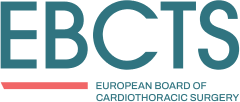FEBCTS

Information for candidates – Level 2 FEBCTS
Introduction
Purpose
The primary aim of The European Board of Cardiothoracic Surgery (EBCTS) is to encourage common high standards and qualifications in cardiothoracic surgery in all European countries and beyond. This should potentially allow for the mutual recognition of these qualifications between European countries and elsewhere.
Standards
The standards are set to award certificates of the Board to surgeons who have attained levels of knowledge and proficiency that can be recognised as appropriate for early and established independent specialist practice in the generality of Cardiothoracic Surgery and sub-specialist areas.
Candidates
Candidates’ applications will be reviewed to ensure that they are eligible to take the examination. Candidates should read the Regulations of the European Board carefully before applying to ensure that they are eligible to take the examination.
The FEBCTS Examination - What to expect
The level 2 Fellowship consists of an oral examination conducted in person with our EBCTS examiners.
The Fellowship examination will assess all the Level One outcomes across the entire syllabus in addition to the Level Two outcomes within the General and chosen sub-specialty area (adult cardiac surgery & congenital cardiac surgery) of the syllabus. This examination will comprise of multiple structured vivas/oral examination with pairs of examiners.
You can choose to take an examination in cardiac surgery or congenital surgery either alone or in combination.
You will be tested on your knowledge, interpretation of investigations, management and judgement by pairs of examiners working together at a table.
Tables will ask you questions based on clinical scenarios themed to coincide with major areas of practice and which are covered in the EBCTS syllabus depending on the examination you wish to take.
For example a cardiac candidate may attend separate tables asking questions about ischaemia, structural heart disease and another covering aortic disease.
Themes and the number of tables may change between diets of the examinations.
Questions are designed to facilitate a conversation between the candidate and the examiner as professional surgeons on important topics in practice.
The total examination time will usually be around 90 minutes.
Results will normally be available within 2 weeks of the conclusion of the assessment.
Examination Fee
The fee for the Level two examinations will be €750 for each speciality of which €300 is for assessment of the file.
The file will not be processed until payment is received in full.
If the candidate is found not to meet the eligibility criteria, €450 will be refunded.
Should a candidate be unable to sit the examination on the appointed date, he will be offered one alternative date and the fee will be held.
If the candidate does not take the examination and does not inform the EBCTS Secretariat one month in advance, no fee will be refunded.
Schedule
The Board will organise the Fellowship examinations in the 2 sub-specialties at least once a year.
